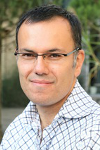IEEE CloudNet'14 Keynote Speakers
Wednesday, 8 October 2014
Professor Sartaj Sahni, University of Florida
Thursday, 9 October 2014
Professor Babak Falsafi, Director of EcoCloud, École Polytechnique Fédérale de Lausanne (EPFL)
Friday, 10 October 2014
Professor Chunming Rong, Head, Center for IP-based Service Innovation (CIPSI), University of Stavanger
 |
Professor Sartaj Sahni
University of Florida |
Green Computing
For decades, computer scientists and engineers have focused on the development of economical computer systems (hardware and software) that are able to solve problems of interest in an acceptable amount of time. Their success in doing this has resulted in an IT industry that accounts for an increasing share of the world’s energy utilization and an increasing share of global carbon dioxide emissions. The current growth rate in energy consumption and carbon dioxide emissions is not sustainable. Sustainability is a new focus for computer systems. Green Computing is concerned with reducing the negative impact that the IT industry is having on the environment. An important impact of the Green Computing revolution on computer scientists and engineers is the addition of energy as a metric in the evaluation of computer systems. Today, we are concerned with the development of economical computer systems that are able to solve problems of interest in an acceptable amount of time and using a minimal amount of energy. This talk will first make the case of Green Computing and then illustrate how algorithmic techniques and trends in the consumer electronics/gaming industries are enabling Green Computing. Illustrative examples include the use of GPUs to reduce the cost of scientific computing.
Biography Sartaj Sahni
Sartaj Sahni is a Distinguished Professor of Computer and Information Sciences and Engineering at the University of Florida. He is also a member of the European Academy of Sciences, a Fellow of IEEE, ACM, AAAS, and Minnesota Supercomputer Institute, and a Distinguished Alumnus of the Indian Institute of Technology, Kanpur. In 1997, he was awarded the IEEE Computer Society Taylor L. Booth Education Award ''for contributions to Computer Science and Engineering education in the areas of data structures, algorithms, and parallel algorithms'', and in 2003, he was awarded the IEEE Computer Society W. Wallace McDowell Award ''for contributions to the theory of NP-hard and NP-complete problems''. Dr. Sahni was awarded the 2003 ACM Karl Karlstrom Outstanding Educator Award for ''outstanding contributions to computing education through inspired teaching, development of courses and curricula for distance education, contributions to professional societies, and authoring significant textbooks in several areas including discrete mathematics, data structures, algorithms, and parallel and distributed computing.'' Dr. Sahni has published over three hundred research papers and written 15 texts. His research publications are on the design and analysis of efficient algorithms, parallel computing, interconnection networks, design automation, and medical algorithms. He is presently the Editor-in-Chief of ACM Computing Surveys
 |
Professor Babak Falsafi
Director of EcoCloud,
École Polytechnique Fédérale de Lausanne (EPFL) |
Big Data and Dark Silicon: Taming Two IT Inflection Points on a Collision Course
Information technology is now an indispensable pillar of a modern-day society, thanks to the proliferation of digital platforms in the past several decades. We are now witnessing two inflection points, however, that are about to change IT as we know it. First, we are entering the Big Data era where demand on robust and economical data processing, communication and storage is growing faster than technology can sustain. Second, while forecasts indicate that chip density scaling will continue for another decade, the diminishing returns in digital platform energy efficiency and the impending "energy wall", is leading server designers towards energy-centric solutions and eventually Dark Silicon. In this talk, I will motivate these two IT trends and present promising research avenues for IT platform and infrastructure designers and operators to help mitigate these technological challenges.
Biography Babak Falsafi
Babak is Professor in the School of Computer and Communication Sciences and the founding director of the EcoCloud research center pioneering future energy-efficient and environmentally-friendly cloud technologies at EPFL. He has made numerous contributions to computer system design and evaluation including a scalable multiprocessor architecture which was prototyped by Sun Microsystems (now Oracle), snoop filters and temporal stream prefetchers that are incorporated into IBM BlueGene/P and BlueGene/Q, and computer system design evaluation methodologies that have been in use by AMD and HP for research and product development. He is a recipient of an NSF CAREER award, IBM Faculty Partnership Awards, and an Alfred P. Sloan Research Fellowship. He is a fellow of IEEE.
 |
Professor Chunming Rong
Head, Center for IP-based Service Innovation (CIPSI), University of Stavanger
Chair, IEEE Computer Society Cloud Computing Special Technical Community (CS CC STC) |
Service Security in Cloud
Cloud Computing makes data truly mobile and a user can simply access a chosen cloud with any Internet accessible device. In Cloud Computing, IT-related capabilities are provided as services, accessible without requiring detailed knowledge of the underlying technology. Thus, many mature technologies are used as components in Cloud Computing, but still there are many unresolved and open problems. Security in the cloud domain is considered as one of the top challenges. Cloud and IT service providers should be responsible for the data of their customers and users. However, accountability frameworks for distributed IT services is current still absent and makes it difficult for users to understand, influence and determine how their service providers honor their obligations. It is important to support users in deciding and tracking how cloud service providers use their data. By combining methods of risk analysis, policy enforcement, monitoring and compliance auditing with tailored IT mechanisms for security, assurance and redress.
In any cloud service model, multiple stakeholders are involved. One service provider can be the consumer of another service. The complex stakeholder relationships require precise monitoring and accounting. Monitoring can be performed in multiple layers with different granularities. In the Infrastructure as a Service (IaaS) model, a customer has a set of virtual machine instances that are reachable by each other. Instances can be located in different geographical regions. A variety of technologies are capable of providing instances’ connectivity, including network virtualization. From the network monitoring perspective, distinguishing customers’ activities in the network is crucial. There are recent studies to improve architecture of the networking services for cloud platform using Software Defined Networking (SDN).
Biography Chunming Rong
Prof. Chunming Rong is head of the Center for IP-based Service Innovation (CIPSI) at the University of Stavanger (UiS) in Norway, where his work focuses on data-intensive (big-data) analytics, cloud computing, security and privacy. He is an IEEE senior member and is honored as member of the Norwegian Academy of Technological Sciences (NTVA) since 2011. He is also an advisor for SINTEF ICT and has extensive contact network and projects in both the industry and academic. He was visiting chair professor at Tsinghua University (2011 – 2014) and served also as an adjunct professor at the University of Oslo (2005-2009). He is co-founder and chairman of the Cloud Computing Association (CloudCom.org) and its associated IEEE conference and workshop series. He is chair of IEEE Computer Society Special Technical Community (STC) for Cloud Computing since April 2014, and is the co-Editors-in-Chief of the Journal of Cloud Computing (ISSN: 2192-113X) by Springer and associate editor of the IEEE Transactions on Cloud Computing (TCC). He received award as Editor's Choice in Discrete Mathematics for 1999, ConocoPhillips Communication Award for 2007, and Sparebank-1 SR-bank Innovation Award for 2011. He coauthored a book titled "Security in Wireless Ad Hoc and Sensor Networks" published by John Wiley & Sons in 2009. Prof. Rong has extensive experience in managing large-scale R&D projects funded by both industry and funding agencies, such as the Norwegian Research Council and the European Framework Programs.







